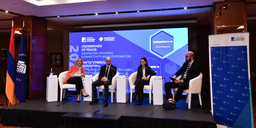Omar Kadkoy
Project Manager
Asmin Kavas,PhD
Eskişehir Osmangazi UniversityFaculty of Economics and Administrative Sciences
Faculty Member (asst. prof)
Related Publication Files

Evaluation Note / Asmin Kavas, Omar Kadkoy
Cities are places where a lot of different groups of people meet. Today, the cities of Turkey are embracing newcomers who, after fleeing war, are settling down in different urban settings. Historically, cities witnessed the birth of a phenomenon exclusive to a certain set of parameters: population density, residential segregation, area isolation, homogeneous relation, and social exclusion. When all of these parameters come together, a ghetto emerges.
The ghetto concept prior to the 1980s was an outcome of ethnic, religious, denominational, and cultural discrimination. Thereafter, the term has also been used to describe parts of cities characterized with poor infrastructures, inadequate social facilities, and socio-economically disadvantaged groups. The beginning of the 2000s brought a new definition to ghettos. The term referred to modern gated communities as spatial productions of consumer culture. The outbreak of the Arab Spring in 2010 triggered waves of cross-border forced migration and resulted in the formation of ghettos consisting of refugees.
A team of TEPAV researchers headed to Önder neighborhood in Ankara to investigate the existence of the above-mentioned parameters and validate the presence of a post-war ghetto or a refugee ghetto. The field research included in-depth interviews with forced migrants and navigated settlement patterns, solidarity, and social networks of Syrian refugees. The field research also looked into factors of social sustainability such as distorted settlement, inadequate public services, crime rates, education levels, poverty, social exclusion, alienation, and political rights.
The findings of the field research include, but not limited to, that Önder neighborhood is a post-war ghetto. Syrians started to settle down in Önder since 2011. Today, the Syrian population represents 90 percent of the 3,088 people who live there. In addition, the neighborhood is not isolated by any physical structures – but Syrians have a minimum interaction with the greater surroundings of Önder. This interaction is largely confined to executing bureaucratic chores. The economic dynamics in Önder are exclusive to identity: Syrians buy only from Syrians and locals buy only from locals. Breaking this form of exclusive survival, especially among Syrians, leads to violence that could escalate to a life threating incidents. The locals, however, who remain in Önder feel under threat and are hostile to Syrians. Consequently, social cohesion is fragmenting and leading to alienation and tension.
You may read evaluation note from here.




